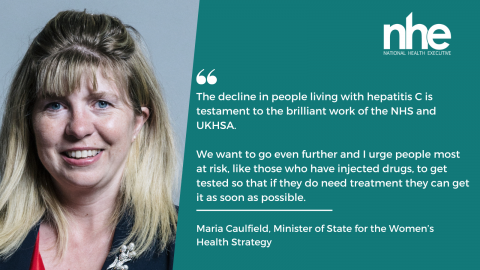A new report from the UK Health Security Agency (UKHSA) shows the prevalence of chronic hepatitis C (HCV) infection in England has seen a dramatic fall compared to a decade ago.
According to the Hepatitis C in England and the UK report, the number of people living with chronic HCV aged over 16 has dropped by more than half (51.6%) since 2015, from around 129,400 to 62,600 in 2022.
The UKHSA says the decline is primarily due to increased testing and better access to treatment – this includes the NHS England (NHSE) opt-out bloodborne virus testing initiative in emergency departments and the fact that more people are accessing antivirals.
Since these effective drugs became available in 2015, NHSE data indicates that nearly 78,000 people have benefited from treatment.
They have also helped reduce HCV-related mortality – these deaths are at their lowest in 10 years, falling from 0.69 per 100,000 people in 2015 to 0.44 per 100,000 in 2022.

HCV is spread by blood-to-blood contact – i.e., by sharing needles, syringes or other non-sterile injecting equipment.
The UKHSA says modelled estimates show 62,600 people were living with HCV in 2022.
One in five (20.1%) of those infections are people who currently or have recently injected drugs, while over two in five (64.5%) of those are people who have previously injected drugs, but are no longer doing so.
The UKHSA’s hepatitis C lead, Dr Monica Desai, said: “Hepatitis C elimination is in reach if we can accelerate testing, support people to access effective treatment, reduce the stigma experienced by people living with hepatitis C and prevent people getting the infection in the first place - particularly for people who inject drugs.”
There are approximately 9,600 people with chronic HCV infection who have never injected drugs.
NHSE launched a website last year where people can order self-testing kits to find the remaining unknown cases – 16,000 kits have been ordered since May 2023.
Responding to the figures, John Stewart, national director for specialised commissioning at NHSE, said: “This data proves that our ambitions are within reach, as we work to eliminate hepatitis C as a public health threat ahead of the 2030 WHO commitment.”
The Hepatitis C Trust’s chief executive, Rachel Halford, highlighted the need for a national strategy to ensure the elimination goal is reached, and maintained over the long-term.
“This will require clear goals, strong disease surveillance, and a balanced approach to tackling the virus,” said Halford.
HCV is a bloodborne virus that can cause liver disease and cancer, which often has no symptoms until significant damage has already been done.
Other people at risk of the virus include people who have:
- Been in prison
- Experienced homelessness
- Had a medical procedure or tattoo abroad
- Come from a country with a higher prevalence of HCV
- Received a blood transfusion before September 1991 or a blood product 1986 in the UK
Image credit: iStock



















